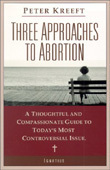Peter Kreeft on what to do about abortion

Introduction to Three
Approaches to Abortion: A Thoughtful and Compassionate Guide to Today’s Most Controversial
Issue | Peter Kreeft
Abortion is the single most divisive public issue of our time, as slavery
was for the nineteenth century, or as prohibition was for the 1920S. Intelligent,
committed pro-lifers will not be satisfied in principle with anything less
than the legal prohibition, or abolition, of all abortion (though most pro-lifers
are pragmatic enough to accept partial abolitions as incremental steps toward
that goal). And intelligent, committed pro-choicers understand this and
resist, also in principle, any of these incremental steps. Pro-lifers find
it intolerable that the most innocent and vulnerable members of our society
and our species are legally slaughtered. Pro-choicers find it intolerable
that women be forced by law to bear unwanted children against their will.
Neither side can or will budge, in principle.
There are only four things that can possibly be done in such a situation.
First, we could simply accept the current standoff and hope it will not
erupt into violence and civil war, as abolitionism did in the nineteenth
century. Perhaps if we do nothing the problem will just go away. Obviously
this is naive and irresponsible. It is also unhistorical. Already in the
U.S. and Canada some have appeared who have murdered abortionists or even
their office workers. They have already done what John Brown did at Harper's
Ferry just before the Civil War: to protest violence, they have used violence.
There is no reason to think that their ilk will simply disappear, or even
diminish.
Second, we could accept the current standoff and put social protections
around the dispute to keep it from erupting into war. What these protections
are, is not clear. No society has yet solved the problem of assassination
by fanatics, especially if the fanatics are willing to die along with their
victim for the sake of their cause. The closest any society has come to
preventing assassinations is totalitarian dictatorship. There were almost
no private assassinations under Stalin, Hitler, Mao, Castro, or Pol Pot;
all assassinations were carried out by the government- Hardly a "solution"!
Third, we could hope that one of the two sides will simply go away, or weaken,
or give up, or at least quiet down—not out of conviction but simply
because of attrition: time, not logic, will solve the problem. I fear this
is also wishful thinking, living in denial, and failing to understand the
depth of conviction of both sides.
Fourth, we could hope that reason rather than force will convince one side
it is wrong. This sounds to many people even more idealistic and unrealistic
than the first three options; but it has happened before. Many practices--including
both slavery and prohibition, as well as torture, cannibalism, blood vengeance
by families, polygamy, and infanticide—have disappeared because humanity
became convinced that these were wrong.
It is my hope that this book will help to make a little progress in this
direction, the direction of peace not through force but through enlightenment-that
is, through truth. Any other peace is perilous, for a peace not based on
truth is not true peace. Certainly, any peace based on ignoring truth, scorning
truth, indifference to truth, or disbelief in truth cannot be true peace.
Read
Review ofThree Approaches to Abortion | Peter
Kreeft's Author Page

Three Approaches to Abortion: A Thoughtful and Compassionate Guide to Today's Most Controversial Issue
by Peter Kreeft
The popular author and professor, Peter Kreeft, tackles the most controversial
issue of our times in his always unique and compassionate style. He presents
approaches to the abortion issue from a logical, psychological and dialogical
explanation of the pro-life position. Kreeft hopes that clear reason,
rather than force, will help convince people of the truth of abortion
and the need to protect innocent human life. He presents the objective
logical arguments against abortion, the subjective, personal motives of
the pro-life movement, and how these two factors influence the dialog
between the two sides of the abortion issue.
“What is left to be said about the abortion debate? First of all,
that is it usually not much of a debate. Peter Kreeft points the way to
taking deepest disagreements seriously in creating and sustaining honest
debate.”
—Rev. Richard J. Neuhaus, Editor, First Things
“We all condemn the atrocities of September 11. Yet many Americans
support legalized abortion, in which we execute every day more innocent
human beings than were killed in the World Trade Center. Peter Kreeft,
with his rare talent for explaining the obvious without patronizing or
pretense, offers here a unique guide for inviting sincere persons to consider
a basic truth – that the law can never validly tolerate the execution
of the innocent.”
—Charles E. Rice, University of Notre Dame Law School
“Peter Kreeft’s book argues for the humanity of unborn human
beings and their right not to be destroyed. Kreeft practices philosophy
the way a skilled brain surgeon practices his own art, i.e., with care,
caution, courage, cunning, capability, and conviction.”
—Donald De Marco, Author, The Heart of Virtue
Peter Kreeft , a
Professor of Philosophy at Boston College, is one of the most widely read
Christian authors of our time. His more than 25 best-selling books include
Back to Virtue, Love is Stronger than Death, Catholic Christianity,
Prayer for Beginners and A Summa of the Summa.
Published on January 22, 2013 00:34
No comments have been added yet.
Carl E. Olson's Blog
- Carl E. Olson's profile
- 20 followers
Carl E. Olson isn't a Goodreads Author
(yet),
but they
do have a blog,
so here are some recent posts imported from
their feed.



